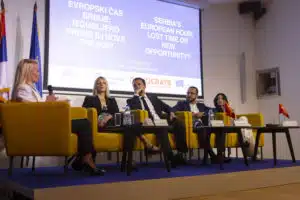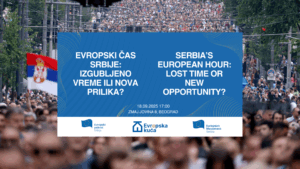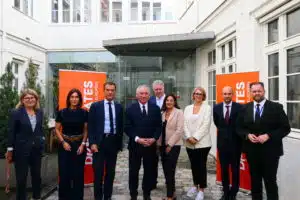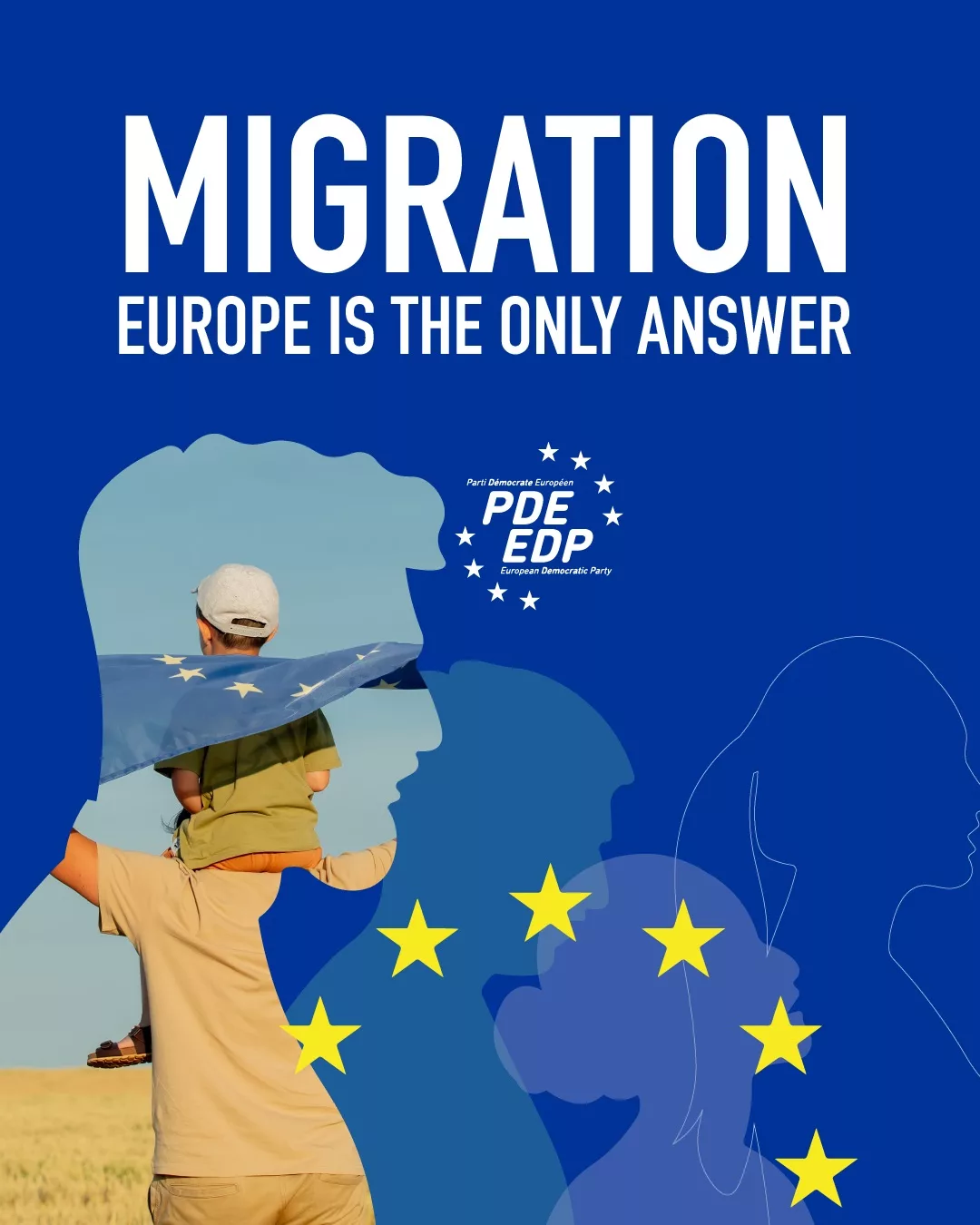Experts in political science, governance, social movements and digital technology gathered on October 26, 2022 in Bilbao to discuss the future of democracy in the new digital age, in a meeting organized by the European Democratic Party (EDP).
Held at the Fundazioa Sabino Arana, the event had as its theme: “The defense of democracy in the digital society”. The event was kicked off with a welcome speech by the Executive Vice President of the PDE, Andoni Ortuzar, who is president of the Euzkadi Buru Batzar of the EAJ-PNV – a PDE member party in the Basque Country. Mr. Ortuzar cited alarming data showing that dictatorial regimes are on the rise and already have authority over 70% of the world’s population. Data from a 2022 report by the University of Gothenburg shows that liberal democracies are at their lowest point in the last 25 years, with only 34 fully democratic countries, or just 13% of the world’s population.
The Jeltzale leader (PNV) Andoni Ortuzar explained that Western society is undergoing great social changes that generate perplexity and unease in many people. “They feel these changes as a loss of control over their lives and needs, and to which the parties and traditional institutions supposedly do not give adequate answers” in recent years.”
The Jeltzale leader (PNV) Andoni Ortuzar explained that Western society is undergoing great social changes that generate perplexity and unease in many people. “They feel these changes as a loss of control over their lives and needs, and to which the parties and traditional institutions supposedly do not give adequate answers” in recent years.”
👉 @MireiaZarate: "Las y los jóvenes son los más escépticos con la eficacia de la #democracia"
— SAF (@sabinoaranaf) October 26, 2022
🤝 @PDE_EDP pic.twitter.com/gcMPSMaXBz
To reverse this trend, he pleaded in his speech for a strengthening of democracy, adding: “We must strive to build open, equitable and inclusive societies, where every citizen, with equal conditions and opportunities, is the protagonist of the collective future. It is essential, from an inclusive humanism, to promote and cultivate a sense of community, not selfish individualism. We must also promote and cultivate social cohesion, cooperation, and combat inequality and all forms of discrimination.
“This fight for democracy must be led by all institutions,” he added. “From local to multilateral, each has its function, but it is fundamental to strengthen the system of multilateral institutions.
Mireia Zarate: Erosion of trust in democracy, traditional parties
Mireia Zarate, president of the Sabino Arana Fundazioa, built on Ortuzar’s words, saying in her opening remarks that turnout and election results in Europe reveal an erosion of confidence in the power of the democratic system to “transform reality. She added that there is a loss of support for the traditional parties and institutions that have coexisted for many decades.
Drawing on a survey published in the United Kingdom, Mireia Zarate pointed out that young people are the most skeptical about the effectiveness of democracy, citing their “frustration with the system because it leads them to uncertain economic prospects and dependence on the family.”
🔎 "El futuro de la democracia depende de nuestra capacidad para superar los desafíos de la era digital". Jornada organizada por el @PDE_EDP 👉 https://t.co/50evIr0Pwf pic.twitter.com/1WM5ZPzjoj
— SAF (@sabinoaranaf) October 26, 2022
Mireia Zarate emphasized that while “the digital world in which young people are growing and developing does not help build trust in democracy, it also has an incredible informational, educational and communicative power, which we cannot give up, and which has transformed our lives by opening many windows of opportunity.”
EDP’s Sandro Gozi, Renew Europe President Séjourné
EDP Secretary General Sandro Gozi and Renew Europe President Stéphane Séjourné also spoke at the morning session. Joined by Sylvain Waserman, former vice-president of the French National Assembly, the three men noted that parties like theirs – progressive, committed to democratic and humanitarian values – must be at the forefront of politics to meet democratic challenges. Otherwise, the management of relations with citizens will be done without them – the worst possible outcome for democracy.
Gozi noted that immediacy to which citizens have become accustomed clashes with how “slowly” democracy works. Another great challenge is for the decision-making processes to be more efficient. Echoing Gozi’s comments, Stéphane Séjourné said that democracy today is different from the past in how we relate to each other. He noted “It’s changing, therefore the way of doing politics must also change.”
💬 @sandrogozi during our Bilbao's conference on the defence of democracy in the digital society : "We have to transform our democracy into a more efficient, faster democracy. This is not caused by the digital era but magnified by." pic.twitter.com/mWzPb4xJDa
— European Democrats (@PDE_EDP) October 26, 2022
The moderator of the event, Irune Zuluaga, parliamentarian and president of Eurobasque, welcomed experts in politics and communication to the stage for remarks. Daniel Innerarity, professor of political philosophy and director of the Institute for Democratic Governance and professor at the European University Institute in Florence, urged politicians at the EDP event to “practice in politics but also practice in life: the successful politician is one who detects the problem well.”
Referring to other speakers, he added: “Polarization is a complex phenomenon, and it can even be perceived as more polarization than it actually is. Political polarization does not imply social polarization.”
Carmen Beatriz Fernández, doctor and president of DataStrategia Consultores, explained in her speech that in Latin America, the demand has increased for a strong leader without having to answer to elections and parliaments. A populist phenomenon, this populism presents an opportunity for political communication.”
The speaker Andrzej Potocki, EDP vice-president, Polish politician, journalist and historian, suggested that in Eastern Europe this tendency to lean towards autocracy predates the explosion of technology, not so different from today. Populism is told around sovereignty being a rejection of the European Union. Andrzej Potocki also suggested that democracy needs responsible citizens. And misinformation is an important factor because people are not aware of the consequences of what populism proposes.
Iker Merodio, a journalist specializing in digital environments, gave concluding thoughts that summarised presenters at the one-day event. He concluded that participants stayed focused on the topic, that most extremist forces squeeze the space available for centrist and moderate parties. Strategy, communication and corporate branding consultant Rafa Suso pointed out that geography has been rendered irrelevant by technology, which also calls into question the nation-state, linked to that geography.
Mireia Zarate appealed directly to the youth, who are increasingly sceptical and show a disaffection that comes from a dissatisfaction: they do not see a stable future.
Policy
On politics, Carmen Beatriz Fernandez locked in on the emergence in 2017 of “cyberpolitics” that led to “cyberpessimism” and loss of trust. This led to the rise of populism. However, the relationship may be more coincidental than causal: the more cyberpolitics there is, the higher the quality of democracy. And it can be an opportunity if it promotes good journalism, increases trust and generates healthy relationships. All of this would disable populism, precisely.
La digitalización es equivalente a la revolución industrial, implica una revolución cognitiva, dice Stephan Sejourne, presidente de @reneweurope. “La confianza se erosiona, y Europa necesita dar respuestas Politicas”
— Carmen Beatriz Fernández (@carmenbeat) October 26, 2022
In his remarks, Daniel Innerarity reminded the room that with the compilation of data that technology now allows, those in power can record what we really want – not what we think we want – and deliver it to us. And it’s easy to think that this is good and can even replace an ideologized party model. The most political aspect of the political process is determining the goal: what are we going to use all this technology for?
Governance: Citizen Relationship Management
On governance, Andoni Ortuzar recalled that citizens must have the feeling of being the protagonists of the collective future. It is important to strengthen the sense of community. This will strengthen institutions and weaken populism. In the same vein, Sylvain Waserman spoke about Citizen Relationship Management, i.e. social relations with institutions. Also related to this new relationship, he cites a risk: the challenges of “digital democracy” can undermine democracy itself. An opportunity exists for citizen involvement: the ability of citizens to complain must be managed by the parties more attached to the humanist vision so that this type of relationship is not managed by other types of parties.
Media: Digital networks versus traditional news
Media experts and journalists examined political journalism in a digital space. Rafa Suso made it clear that we are not properly carrying out the necessary digital transformation because an important part of the actors who should carry it out are in crisis. Miquel Urmeneta, journalist, university professor and communication consultant, stressed that audiovisual communication continues to dominate the digital age. The elites are still those who were – and are – outside this digital sphere, although with some exceptions.
The tension between media and new media can be resolved, said Daniel Innerarity, by combining the horizontal nature of social networks with the vertical structure of traditional media, providing a necessary analysis that can only be offered from the media to the public, without conversation. Rafa Suso responded by saying that the media still has room for analysis. He also warned us that the public is abandoning media that is not able to keep up.
Sandro Gozi closed the last session by reminding the audience that the media, both new and old, present risks but they are not the only ones. The far right finances parties that directly influence democratic processes. The event ended with a quote from Tom Wheeler, an advisor in the administration of U.S. President Barack Obama, which gave participants food for thought: “Networks that expand citizen participation also undermine state sovereignty. The same networks that create economic opportunity, improve quality of life, and expand political participation also provide the organizational and management tools necessary for violent attacks on national stability.”
Related member(s)
Related news

The EDP in Belgrade for a European Serbia: legality, free media, fair elections
During the two days of 18–19 September in Belgrade, the European Democratic Party delivered a clear message

Serbia’s European Hour – Lost time or a new opportunity?
European Movement in Serbia, in collaboration with the European Democratic Party, is organising a public debate entitled “Serbia’s European Hour – Lost Time or New Opportunity?”

PDE seminar in Paris: reforms, global challenges, and support for François Bayrou
EDP MEPs in Paris with Gozi, Bayrou and Barrot: priorities for Strasbourg, governance reform, the cost of living, ecological transition and Europe’s global role
Related theme





